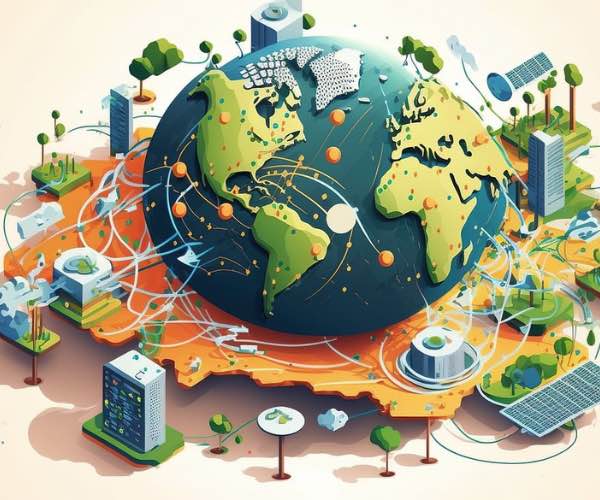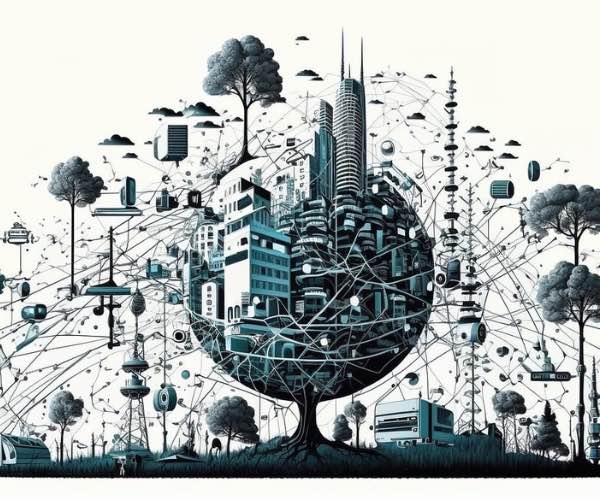
Jun 11 2024.
views 191The modern age has brought omnipresent internet connectivity and rapid technological advancement directly into our homes. The Internet of Things (IoT) is transforming ordinary household objects into internet-connected smart devices capable of data collection, input reception, and communication. This proliferation of smart home technology promises to revolutionise domestic life through increased convenience, energy efficiency, safety, and home automation.
Smarter Appliances
Leading this revolution are once-ordinary appliances and fixtures being reinvented for the IoT era. Everyday items like light bulbs, thermostats, door locks, and kitchen appliances now feature wireless connectivity, sensors, and microprocessors. This allows them to be remotely monitored and controlled via smartphone apps and voice commands.
For example, IoT-enabled hand dryers from manufacturers like Dyson utilise infrared sensors for automatic hand detection. They track usage metrics, determine the time to the next filter change, and can adjust air temperature and speed - even enabling remote activation. Owners monitor dryer status and control settings from their mobile devices.
On a larger scale, modern washing machines integrate transformative IoT capabilities. Models from Samsung and LG offer Wi-Fi connectivity for seamless smart home integration. Users remotely start, pause, and monitor wash cycles, receiving notifications when loads are complete. The appliances can even automatically order detergent supplies and optimise water/energy usage based on load characteristics.

Integrated Ecosystems
While individual smart devices provide benefits, the true power of IoT lies in ecosystem integration and centralised control. Platforms from Apple, Amazon, Google, and Samsung unite disparate devices through unified connectivity and control interfaces. A smart speaker or mobile app becomes the central hub operating lights, thermostats, security systems, entertainment, and appliances.
Home Automation
Fully realised, a smart home ecosystem allows powerful automation. Imagine automatically waking up to gradually brightening lights, opening smart blinds, a brewing coffee machine, and ideal morning music streaming throughout the home. When leaving for the day, a single command could lock doors, arm security, adjust climate settings, and confirm inactive appliances - all personalised to your living patterns.
Energy Efficiency
Beyond convenience, smart home tech drives major potential for energy cost savings through enhanced efficiency. Smart thermostats dynamically adjust heating and cooling based on ambient conditions and occupancy patterns. Smart bulbs automatically dim or turn off in vacant rooms. Smart power strips cut power to inactive devices, eliminating standby draw. Collectively, these optimizations compound into tangible utility savings over time.
Home Security
Home security also sees major IoT benefits. Smart monitoring systems send alerts for opened doors/windows, detected motion, fire alarms, and CO2 leaks - with wireless camera video feeds viewable from mobile devices. Smart door locks enable remote locking/unlocking and secure temporary keyless entry.

Sri Lanka's Smart Home Adoption
While residential IoT emerges globally, some forward-thinking areas rapidly embrace smart home tech. In Sri Lanka, the smart home revolution presents opportunities to modernise ageing infrastructure and bypass outdated technologies. Through public-private partnerships, the country implements smart city initiatives like renewable energy, traffic management, and digitized civic services (for example: Colombo's "Smart Traffic Lights" project).
On the residential front, major Colombo developers incorporate smart home-ready designs and IoT infrastructure into new construction projects. Individual homeowners also outfit existing dwellings with smart devices as budgets permit. Though smart home integration requires upfront investment, the long-term benefits drive adoption through cost savings, convenience, security, and efficiency.
An Aspiring IoT Enthusiast's Perspective
As an aspiring software engineer and tech enthusiast, I highly recommend exploring the world of IoT and embedded systems development through hands-on platforms like Arduino and Tinkercad's simulator. From school days to working life, I've been fascinated by studying IoT's importance and practising its applications, even without physical hardware kits initially.
This field is a super interesting domain that allows merging cutting-edge technologies with tangible, real-world use cases. Personally, I've been honing my skills in Java - an object-oriented language well-suited for embedded development due to its minimal hardware dependencies and rich library ecosystem, making it one of the best options for creating IoT solutions.
For those looking to follow a similar path, a plethora of certification courses and learning resources are available from renowned providers like The Great Learning, Simplelearn, Coursera, Cisco Networking Academy, and Udemy. While I don't consider myself an expert or highly advanced yet, the journey of a passionate beginner constantly striving to reach intermediate proficiency is immensely rewarding.
The beauty of exploring fields like IoT lies in the love for continuous learning, practising implementations, and not allowing failures to inhibit motivation. Even temporary setbacks serve as stepping stones toward the ultimate green light of success. The intersection of software, hardware, and connected ecosystems sparks creativity and innovation.
The New Norm
As this trend globalises, smart homes will become the new norm. The Internet of Things fundamentally transforms how we interact with living environments. While the smart home revolution is nascent, it's allowing us to regain domestic convenience and control. Our homes have never been smarter, but this merely previews a larger IoT transformation on the horizon. As residential IoT connectivity becomes the new normal, our homes will keep getting smarter and more personalised to our lifestyles. The smart home revolution is simply the first step in a much broader paradigm shift being driven by the Internet of Things.
1 Comments
Moussa Ouallaf says:
Aug 11, 2024 at 02:10 amWe would like to connect with the owner. We are a company that develops innovative solutions to challenges in the hotel/accomatation industry. We have something interesting to offer that may be of specific value to the company. We can be contacted at [email protected].